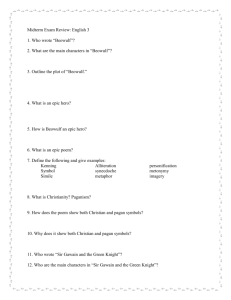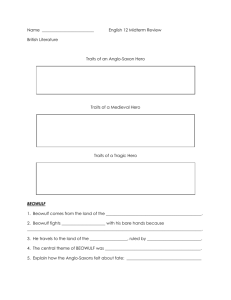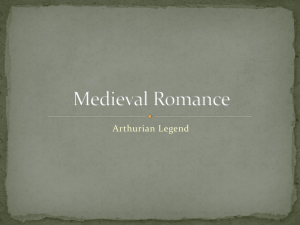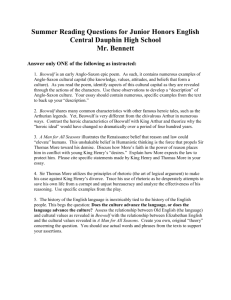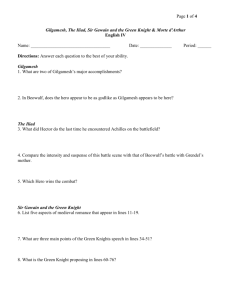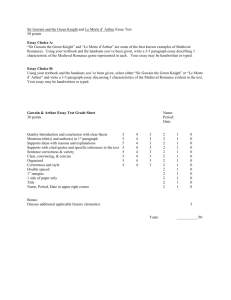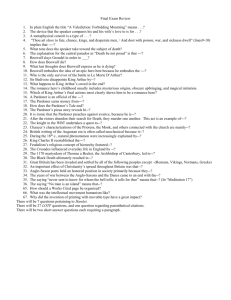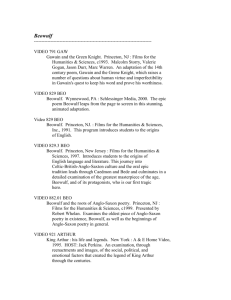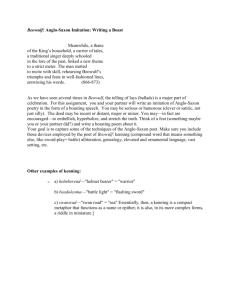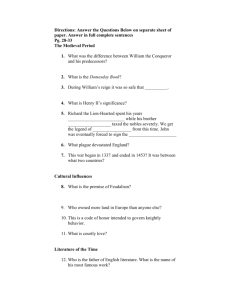English 12 Final Exam Study Guide
advertisement
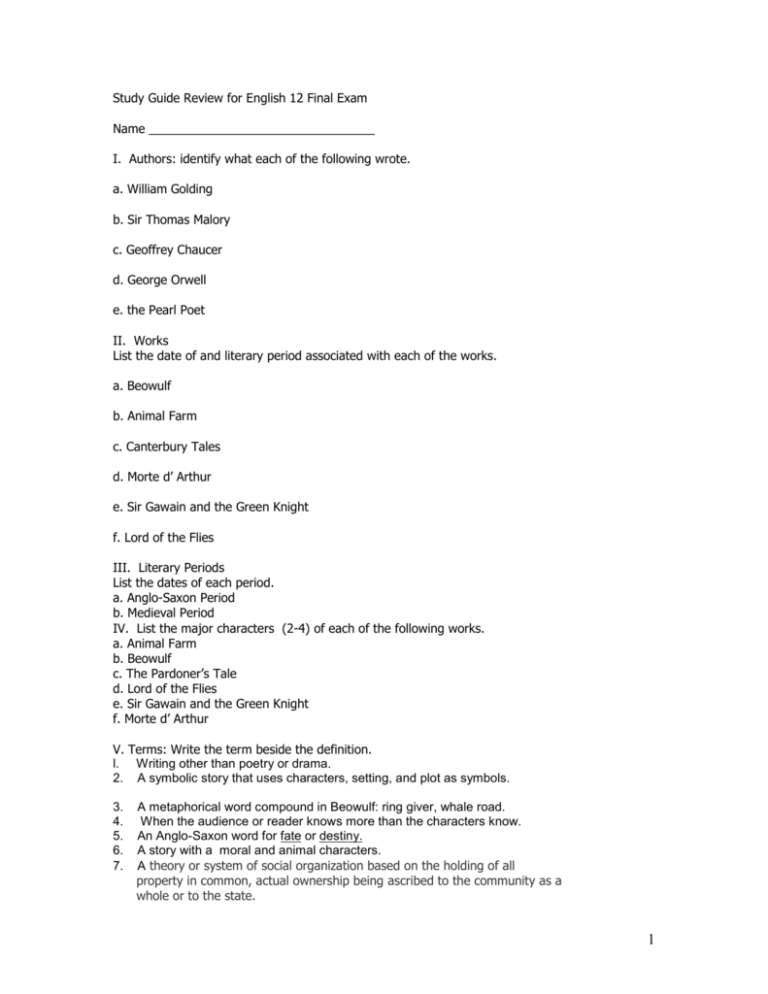
Study Guide Review for English 12 Final Exam Name _________________________________ I. Authors: identify what each of the following wrote. a. William Golding b. Sir Thomas Malory c. Geoffrey Chaucer d. George Orwell e. the Pearl Poet II. Works List the date of and literary period associated with each of the works. a. Beowulf b. Animal Farm c. Canterbury Tales d. Morte d’ Arthur e. Sir Gawain and the Green Knight f. Lord of the Flies III. Literary Periods List the dates of each period. a. Anglo-Saxon Period b. Medieval Period IV. List the major characters (2-4) of each of the following works. a. Animal Farm b. Beowulf c. The Pardoner’s Tale d. Lord of the Flies e. Sir Gawain and the Green Knight f. Morte d’ Arthur V. Terms: Write the term beside the definition. l. Writing other than poetry or drama. 2. A symbolic story that uses characters, setting, and plot as symbols. 3. 4. 5. 6. 7. A metaphorical word compound in Beowulf: ring giver, whale road. When the audience or reader knows more than the characters know. An Anglo-Saxon word for fate or destiny. A story with a moral and animal characters. A theory or system of social organization based on the holding of all property in common, actual ownership being ascribed to the community as a whole or to the state. 1 8. A sermon with a moral: “The Pardoner’s Tale.” 9. A recurring symbol, image, or theme. 10. A writing that uses wit to point out flaws of a work in order to inspire reform: Animal Farm. 11. “God from the Machine”; a contrived or unrealistic ending. 12. The more primitive aspect of the psyche according to Freud. 13. A theory or system of social organization that advocates the vesting of ownership and control of the means of production and distribution of money, land, goods, in the community as a whole to benefit all. 14. A type of compound word metaphor used in Beowulf such as “Whale road.” 15. A reference in one work of literature to something in history or art or other literature that the writer expects the reader to recognize. 16. A poem consisting of an alternating rhyming four-line stanza; popular in the Medieval Period. 17. The worker in Communist societies: Animal Farm. 18. The part of the psyche that represents the conscience or sense of right and wrong. 19. Idea that humans are basically good until corrupted from outside infuences. 20. Rational, acting part of the psyche. 21. Period in literature from 440-1066: Beowulf. 22. A type of writing that contains a hero, a love interest, the supernatural, and chivalry. 23. 1066-1485: a time in history with great changes: Chaucer. 24. The poet or storyteller in Anglo-Saxon times. 25. A long narrative poem that relates the great deeds of a larger-than-life hero. 26. The bonds of loyalty and brotherhood that bound the thane to his lord in Anglo-Saxon times. 27. A mesh shirt made of tiny iron rings (armor). 28. 29. 30. 31. 32. Having to do with the land in medieval times. Leading character involved in the conflict. One party in absolute control. Repetition of initial consonant sounds. Pause in a line of poetry VI. Letters: Identify where each of the following is placed in the letter and what each is. a. heading b. inside address c. complimentary close 2 d. salutation 1)What punctuation is used after the salutation? 2)After the complimentary close? 3)What gets capitalized in the complimentary close? 4)In the salutation 5)Which gets indented—modified block or block? VII. Punctuation l. 2. 3. 4. What is a comma splice? What is a fragment? Which introduces, a colon or a semi-colon? Which is used to separate, a semi-colon or a colon? 5. Label these sentence I or C. Correct them if they are incorrect. a. My back is hurting, I need to lie down. b. Although, he is here, he won’t say anything. c. If you want to go to the nurse or the office for some aspirin. d. My thoughts are these: Study for your test, do your review sheet, and get a good night’s sleep. e. I fell asleep; however I woke up later. f. The test is tomorrow, and you need to be here for it. g. The classes you need to graduate are: science, math, English, history, and health. h. The chili is delicious; I had two bowls. i. I know that you tried; although your grade does not reflect it. j. They left us some money; but we did not take it. k. However, the rain has stopped. l. Well, I am not sure what you mean. m. If you are not going to say anything. n. The frightened small child ran from the room. o. My friends dropped me off at the game, but I did not stay. p. If he is not a member of the club he will have to pay to get in. VIII. Usage. Circle or highlight the correct sentence. 1. 2. 3. 4. 5. 6. 7. 8. 9. a. She looks like she is really tired. b. She looks as though she is really tired. a. I am not sure how it will effect you. b. I am not sure how it will affect you. a. Mom said it was alright to stay until 12. b. Mom said it was all right to stay until 12. a. Irregardless of what you say, I do not believe it. b. Regardless of what you say, I do not believe it. a. She is a disinterested party so ask her to judge. b. She is an uninterested party, so ask her to judge. a. Please stop aggravating your brother. b. Please stop irritating your brother. a. I think Kim was trying to elude me in the mall. b. I think Kim was trying to allude me in the hall. a. Hopefully, I will earn an A. b. I hope that I earn an A. a. In a while you will go home. 3 b. In awhile you will go home. 10. a. I had a really fun time last night. b. I had a lot of fun last night. 11. a. Adolph Hitler has acquired a notorious reputation. b. Adolph Hitler has acquired a famous reputation. 12. a. The amount of dropouts is high. b. The number of dropouts is high. 13. a. Between you and me, I think she is evil. b. Between you and I, I think he is evil. 14. a. Her dad tried to ensure her success by sending her to the best college. b. Her dad tried to insure her success by sending her to the best college. 15. a. The doorknob is loose, I think. b. The doorknob is lose, I think. 16. a. Did anyone try and help? b. Did anyone try to help? 17. a. I run better than he. b. I run better then he. 18. a. Being as you are late, you must go to the office. b. Because you are late, you must go to the office. 19. a. They did it theirselves. b. They did it themselves. 20. a. You must learn algebra, to write an essay, and biology. b. You must learn algebra, essay writing, and biology. 21. a. I was literally hopping mad. b. I was figuratively hopping mad. 22. a. The new medicine may not have an effect on you. b. The new medicine may not have an affect on you. 23. a. We have a lot of homework. b. We have alot of homework. 24. a. It is not all right with me. b. It is not alright with me. 25. a. They are all together too noisy. b. They are altogether too noisy. IX. Vocabulary Choose the letter of the best response. l. mundane a. intelligent b. under threat c. persistently bad d. ordinary 2. indigent a. foreign b. poor c. more than is needed d. cautious 3. ennui a. excessive b. predictable c. boredom d. insincerity 4. incognito a. to be an expert b. in disguise c. loud d. to leave secretly and quickly d. not memorable 5. nebulous a. hazy b. to be a minor c. wasteful d. private 6. extraneous a. not relevant b. speedy c. fulfilling d. formal 7. venerate a. to lie b. to be bold c. to honor d. to harm 8. antipathy a. slander b. strong dislike. public praise d. trickery 9. erudite a. kind b. to be learned c. frightened d. to be emotionless 10. charlatan 4 a. someone who masquerades or tricks b. someone who appeases c. someone who reports to a person of authority d.someone who values the past 11. euphony a. a poem of honor b. a speech about someone who had died c. displeasing or harsh sounds d. pleasing or melodious sounds 12. introvert a. poor and wretched b. a social person c. someone who shows concern d. a private or shy person 13. immutable a. favorable b. predictable c. unchangeable d. reserved 14. assimilates a. diligent; hardworking b. to be absorbed c. to behave politely d. to be abnormal 15. copious a. plentiful b. bold c. beliefs d. excessive 16. feign a. to pretend b. to be convincing c .to replace d. to receive a privilege 17. farcial a. humorous b. ridiculous c. happy d. well adjusted 18. nondescript a. changeable b. questionable c. not remarkable d. not memorable 19. bravado a. false courage b. arrogance c. a quarrel d. a challenge 20. expatriate a. traveling b. poor c. self-exiled d. scant or small 21. facile a. easily done b. to be at one’s lowest point c. peak in career d. assumed self-importance 22. homily a. a large space b. a poem for the dead c. a worldly person d. a moral talk 23. paragon a. one’s spirit b. an example c .the law d. the future 24.cognizant a. to be aware b. to charm c. to learn d. to admit the truth 25. lampoon a. to threaten b. to hush c. to declare d. to satirize 26. artifice a. honesty b. trickery c. flattery d. music 27. paragon a. judge b. moment c. lack d. example 28. idiosyncrasy a. commitment b. idea c. talent d. peculiarity 29. aberration a. deviation b. truth c. similarity d. theory 30. diurnal a. monthly b. daily c. weekly d. nightly 31. dearth a. scarcity b. love c. supply d. choice 32. exhort a. laugh at b. praise highly c. urge strongly d. blame 33. nonentity a. person of little importance b. person of wealth c. nothing d. adventurous person 34. dogma a. help b. generosity c. belief d. responsibility 35. implicit a. unquestioning b. official c. assumed d. written 36. banal a. novel b. exciting c. commonplace d. memorable 37. lugubrious 5 a. borrowed b. frightening c. pleased d. happy e. mournful 38. glib a. carefully worded b. quick but sincere c. smooth but insincere d. confused 39. purloin a. to steal b. to write c. to state d. to receive e. to open 40. nemesis a. peers b. reward c. teacher d. death e. avenger 41. hyperbole a. understatement b. honesty c. exaggeration d. foresight 42. nebulous a. vague b. precise c. grand d. important e. forgotten 43. abject a. apparent b. forgotten c. hidden d. wretched e. dignified 44. amorphous a. thick b. sticky c. shapeless d. small e. enormous 45. proffer a. deny b. request c. enjoy d. use e. volunteer 46. colloquy a. game b. conference c. business d. play e. benefit 47. inscrutable a. mysterious b. difficult c. morose d. hidden 48. fortnight a. a month b. 2 weeks c. daily d. yearly 49. ignominious a. shameful b. hateful c. hidden d. innocent 50. reparation a. to make amends b. to sue c. to find fault d. to get even 51. engender a. to worry b. to frighten c. to endanger d. to produce 52. impervious a. unaffected b. influenced c. to make happen d. snobbish 53. filial a. an end b. befitting a son or a daughter c. inherited d. hard to understand 54. posthumously a. in a letter b. after one has graduated c. after death d. before birth 55. avarice a. lust b. charity c. penance d. greed Part II. Terms: Choose the term that fits best. Highlight the answer 26. A recurring symbol, theme, or idea. a. scop b. metaphor c. motif d. apostrophe 27. The worker in Communist society a. bourgeois b. proletariat c. dues ex machina d. totalitarian 29. The bonds of loyalty that bound the lord and thane. a. allegory b. wergild c. wyrd d. comitatus 30. A long narrative poem about the deeds of a great hero. a. elegy b. epic c. romance d. soliloquy 31. Having to do with the land in medieval times. a. bourgeois b. proletariat c. feudal d. clergy 6 32. The poet or storyteller in Anglo-Saxon times. a. wyrd b. scop c. bard d. emissary 33. When the reader has important information that the characters do not. a. verbal irony b. dramatic irony c. situational irony 34. A compound word metaphor used in Anglo-Saxon time a. apostrophe b. caesura c motif d. kenning 35. a symbolic story a. epic b. romance c. allegory d. tragedy 36. When one party is in absolute control a. caesura b. fascism c. socialism d. totalitarianism 37. Repetition of initial consonant sounds a. caesura b. alliteration c. allegory d. allusion 38. Writing other than poetry or drama a. verse b. blank verse c. prose d. epiphany 39. A reference in one work of literature to something in history or literature that the writer expects the reader to recognize. a. foil b. motif c. allegory d. allusion IX. Punctuation: Label as Correct or Incorrect 40 I have no idea what you mean, I am serious. 41. She is a nice woman; she is well liked. 42. The man gave candy to: the kindergarteners, the first graders, and the second graders. 43. I chose the following people: Andrea, a runner; Mickey, a basketball player, and Tara, a tennis player. 44. The day was over, however, the teacher continued to lecture. 45. If you do not stop talking to me like that. 46. Regina will graduate in May; furthermore, she will begin college in July. Other: Multiple Choice 47. Greed is the root of all evil is the theme of A. Beowulf b. The Pardoner’s Tale c. Morte d Arthur d. Animal Farm 48. Who learns the meaning of honor? a. Beowulf b. the Green Knight c. Gawain d. Arthur 49. Which did Sir Thomas Malory write? a. Sir Gawain and the Green Knight b. Beowulf c. Morte d’ Arthur d. Canterbury Tales 50. Which work was published in 1945? a. Morte d' Arthur b. Canterbury Tales c. Animal Farm d. Beowulf 51. Who is a hypocrite and does not care? a. Arthur b. Bedivere c. the Green Knight d. the Pardoner 52. Which work is associated with 750 A.D.? a. Sir Gawain and the Green Knight b. Beowulf c. Canterbury Tales d. Morte d' Arthur 53. The Pearl Poet wrote a. Sir Gawain and the Green Knight b. Canterbury Tales c. Morte d' Arthur Parallel Agreement Directions: Determine whether the sentences below contain errors in parallel structure. Fix any problems that you find. 1. Monica brewed espresso, steamed milk, and told jokes as she prepared Mike’s latte. 2. Natasha tried holding her breath, chewing a piece of gum, and poking her belly, but she could not quiet her empty stomach, which rumbled during the chemistry exam. 7 3. In the restroom, Tishena was brushing her hair, freshened her lip-gloss, and took deep breaths, trying to work up the courage to walk to her first speech class. 4. Celine looked behind the toilet, in the laundry basket, and checked under the bed, but she could not find Squeeze, her nine-foot albino python. 5. Not only did Dennis apply an extra layer of deodorant to his armpits, but he also polished each tooth with special care. He did not want to offend Malinda with any unpleasant odors. 6. For his first date with Malinda, Dennis bought not only a dozen roses but he also purchased a box of chocolates. 7. Not only did Malinda squeal at the sight of the beautiful bouquet, but she also was tearing open the box and eating chocolates all the way to the restaurant. 8. Dennis tried to be thoughtful and generous, yet Malinda refused to give him not only a kiss good night but also a single chocolate from the nut and caramel sampler. 9. Chelsea had to paddle past a school of jellyfish, kick a small sand shark in the nose, and untangle seaweed from her surfboard before she reached her favorite point break. 10. Spiders that bite, hissing snakes, and squealing rodents fill the aquariums in Desmond’s basement. 11. Class with Dr. Rogers was a nightmare: the clock seemed stuck in place, the air conditioner blew inadequate cool, and a fluorescent bulb buzzed overhead. Clauses. Underline the independent clause once and the subordinate one twice. l. The man who is speaking is the principal. 2. When you get back from the office, do your paper. 3. If you are not going to the prom, you do not need a ticket. 4. The paper that you need is on the table. 5. Falling from the sky, the plane looked tiny. 6. He left to do his homework that he had not finished, but he stopped by the office first. 7. I did not attend because I had to work. 8. Through practice, you will improve. 9. She is attending IU, but intends to transfer. 10. I like to play tennis; however, I do not play often. Now go back and label the sentences Simple, Compound, Complex, or Compound-complex. 8 9
